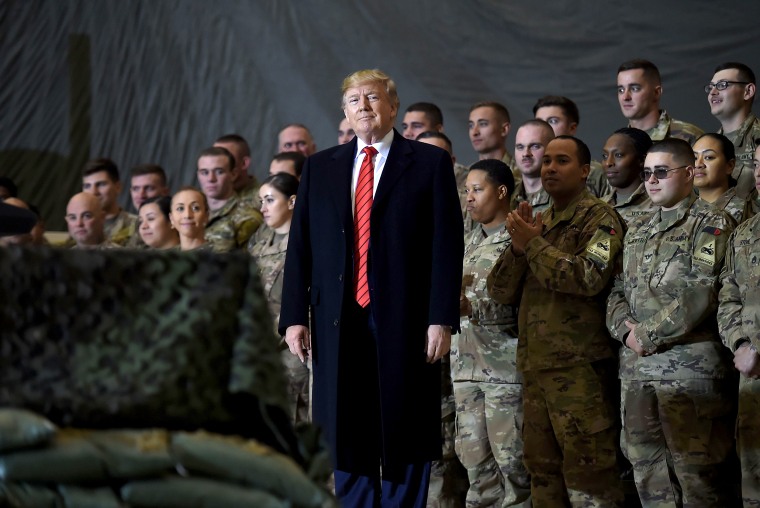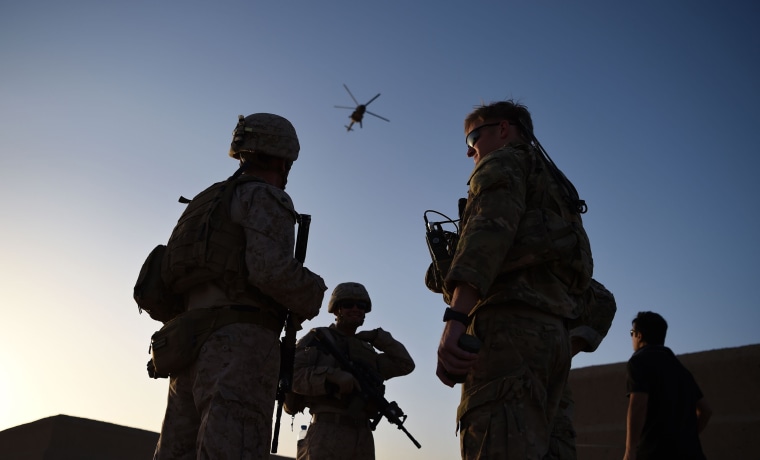WASHINGTON — President Donald Trump is considering a sweeping foreign policy speech before the Nov. 3 election and has been pressing members of his national security team to accelerate specific initiatives that he could highlight in his remarks, such as a U.S. troop withdrawal in Afghanistan, according to two senior administration officials and a former official briefed about the conversations.
The administration has made public its plans to reduce the U.S. presence to 4,500 troops by November, but the officials said a decision to draw down to 3,000 or fewer by early next year has already been reached. Trump has discussed with aides the idea of using the speech to announce the additional decrease, the officials say.
Trump's advisers have pushed back publicly and privately, however, on his demand for a full withdrawal by January.
"I don't think there's anyone who believes we'll be at zero by the end of the year," a senior administration official said.

The speech would focus on Trump's China policy, his administration's negotiations with Russia over a new nuclear arms agreement and his overarching strategy for U.S. competition with other global powers, the officials said. It also would outline Trump's efforts in the Middle East, in particular his administration's success in facilitating normalized relations between Israel and some of its Arab neighbors.
The officials said Trump would use the moment to cast himself as the first president in a decade not to have gotten the U.S. into a new military conflict, with an emphasis on his efforts to bring U.S. troops home from war zones and the campaign to defeat the Islamic State terrorist group, or ISIS.
No final decision has been made on the timing of such a speech or a venue, officials said. The president's team also hasn't decided whether it would be a campaign speech or an official White House event, an official said.
Delivering a foreign policy speech in the closing weeks of the campaign would be designed to contrast Trump's record with that of Democratic nominee Joe Biden.
Biden was at the forefront of U.S. foreign policy as a senator for more than three decades and for eight years as vice president. He has stressed his knowledge of foreign affairs and experience on the world stage. He has said he supports a drawdown in Afghanistan that is based on conditions on the ground.
He recently told the military newspaper Stars and Stripes that he couldn't promise to fully withdraw troops from Iraq, Syria and Afghanistan, but he expressed support for smaller numbers of troops for counterterrorism operations. He said there should be a maximum of "1,500 to 2,000" troops in Afghanistan.
A New START
Trump has also been critical of Biden's approach to China. Biden has promised to pursue an aggressive China policy if he is elected and to push back against what he has described as Beijing's unfair trade practices.
Trump initiated a trade war with China and sought a new agreement, but after an initial deal, talks hit an impasse. Trump at first praised Chinese President Xi Jinping for his handling of the coronavirus, but he is now sharply critical of him.
Biden and Trump have opposing positions on the 2015 Iran nuclear deal known as the Joint Comprehensive Plan of Action, which was negotiated during the Obama-Biden administration. Trump withdrew the U.S. from the agreement in 2018.
Officials said they expect that a Trump speech would highlight the normalization of relations between Israel and the United Arab Emirates, called the Abraham Accords, as well as troop drawdowns in Iraq, Syria and Afghanistan.
Trump could argue that the number of U.S. troops overseas steadily increased for decades while Biden was serving in Washington, even though as vice president Biden often advocated for a smaller U.S. troop footprint.
Biden oversaw the U.S. withdrawal from Iraq in 2011, which critics say created the conditions for the rise of ISIS.
Trump has repeatedly declared an end to the ISIS caliphate during his presidency, but ISIS continues to be active in the region. His strategy to combat ISIS was an acceleration of the one adopted by the Obama administration, and his abrupt decision to withdraw U.S. troops from northeastern Syria was seen by military leaders as potentially jeopardizing gains against ISIS. His first defense secretary, James Mattis, resigned over that decision.
Trump has also said his diplomatic outreach to North Korea has averted another war, a line he could repeat in a foreign policy address. Negotiations between the U.S. and North Korea have stalled, and North Korean leader Kim Jong Un has continued to antagonize the U.S.
Download the NBC News app for breaking news and politics
A Trump administration official said Tuesday that the U.S. and Russia had reached "an agreement in principle" to extend a current arms treaty, New START, which Trump could tout as a win in a speech. Speaking to the Heritage Foundation think tank, the special presidential envoy for arms control, Ambassador Marshall Billingslea, said the U.S. is willing to extend New START if Russia agrees to a freeze on its nuclear arsenal.
In August's NBC News/Wall Street Journal poll, voters preferred Biden to Trump by 49 percent to 39 percent when asked who would be better at handling foreign policy. A Pew Research Center survey last month showed that over the past year, confidence in the U.S. among America's allies continued to decline.
'Home by Christmas'
Trump has pushed his advisers since he took office to draw down troops in Afghanistan.
The issue came up again during a recent White House meeting, officials said, and Trump pushed to bring home all American forces. But military advisers, including the chairman of the Joint Chiefs of Staff, Army Gen. Mark Milley, argued in favor of keeping a so-called residual force in Afghanistan to defend the large U.S. Embassy in Kabul and to conduct counterterrorism missions, according to two senior administration officials and a defense official.
Growing increasingly frustrated at the pushback, Trump made his views known on Twitter. "We should have the small remaining number of our BRAVE Men and Women serving in Afghanistan home by Christmas!" he wrote last week.
Trump's public declaration was intended "to light a fire under the commanders," a senior administration official said.
The president also dispatched his national security adviser, Robert O'Brien, to publicly lay down a marker, officials said. O'Brien previewed the president's decision to draw down to about 2,500 troops early next year during a speech at the University of Nevada, Las Vegas, last week, saying: "We think Americans need to come home."
Two senior administration officials said that the decision to decrease to 2,500 to 3,000 by early next year has already been made and that military planners are working on options now. But they said there are still no plans for a full withdrawal.
The Pentagon has not drawn up any new plans for a complete U.S. withdrawal by the end of December, the senior administration and defense officials said. And the president has given no order to the military to come up with such a plan, the officials said. But a senior administration official said that the administration is encouraged by the intra-Afghan negotiations and that if they are successful, more U.S. troops could come home before the end of the year.
But the current drawdown from 8,600 to 4,500 comes as the Taliban continues to violate the February peace agreement by attacking the Afghan National Security Forces.
In February, the U.S. and the Taliban struck a landmark deal in Doha, Qatar, agreeing that foreign troops would leave Afghanistan by May 2021 in exchange for various guarantees from the Taliban, including a permanent cease-fire and a power-sharing agreement with the Afghan government.
Trump has told his advisers that he wants as many troops home for the holidays as possible, the official said. Realistically, 2,500 troops is as low as the U.S. plans to go for now, and there's an effort to persuade Trump to equate that essentially with zero, officials said.
A U.S. military official cautioned that if Trump does not win re-election, any plans for an additional drawdown would be thrown into doubt. "Any decision would have to be re-evaluated if Biden wins the election," the official said.
U.S. military leaders continue to argue that any drawdown in Afghanistan would be based on conditions on the ground. In an interview Sunday with NPR, Milley said the plan is to draw down to 4,500 by November.
"It's a conditions-based plan," he said, adding that the U.S. is continuing to monitor the conditions.
While the Taliban hasn't attacked Americans or coalition forces since the agreement was signed, its attacks against Afghan Security Forces, or ANDSF, have continued and accelerated at times.
The spokesperson for U.S. Forces Afghanistan said Monday on Twitter that the U.S. has conducted "several targeted strikes in Helmand to defend ANDSF forces under attack by Taliban fighters."
Army Gen. Scott Miller, the commanding general, wrote: "The Taliban need to immediately stop their offensive actions in Helmand Province and reduce their violence around the country. It is not consistent with the US-Taliban agreement and undermines the ongoing Afghan Peace talks."
Since the signing, U.S. forces in Afghanistan have conducted other strikes against the Taliban to defend the Afghans, but a defense official said the strikes in the past few days are by far the largest number of engagements or most concentrated number of strikes.


